-
What Do I Do If My Crown Comes Off?
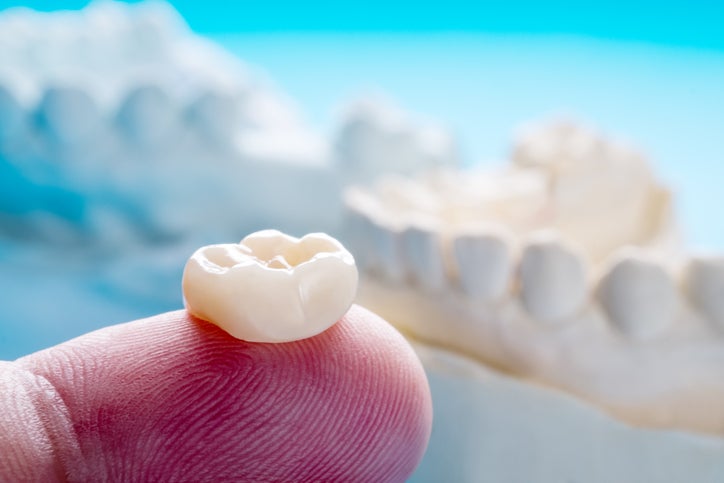
Many Americans have one or more dental crowns. This restorative dentistry option gives you back your smile after a tooth has been damaged by decay or traumatic injury. While crowns are meant to be permanent additions to your mouth—either cemented on top of a natural tooth or screwed into a receiving hole on a dental implant—they do sometimes come loose. Here’s what you should do if your crown falls off.
Retrieve the Dental Crown
Once you realize your dental crown is missing, act quickly to resolve the issue. First, locate the crown. If it’s still in your mouth, take it out. If it fell on the ground, try to find it. If you swallowed the crown, don’t panic—you will simply need to be fitted with a new one.
Inspect & Clean the Crown
Assuming you have located it, rinse off the crown with warm water and examine the interior side closely. If the crown looks completely hollow or has a small metal rod emerging from it, you might be able to temporarily place it back in your mouth before visiting the dentist for a more permanent solution.
However, if you see part of your tooth stuck within the crown, this means it didn’t lose adhesion—rather, your tooth has deteriorated further and broken off. In this case, you should not attempt to place the crown back in your mouth. Instead, put it in a safe place, such as a small container or plastic bag, until you can meet with your dentist.
Protect Your Tooth
Crowns are intended to shield the underlying structures of a damaged tooth. This means nerves and other sensitive tissues may now be exposed, causing sensitivity to touch and temperature. You may be able to find dental cement at a pharmacy to temporarily replace the crown until you can visit the dentist. Even if you lost the crown or can’t reattach it, you can protect the exposed tooth by molding dental cement or wax around it.
Then, be careful about what you eat. To avoid potentially dislodging the crown again, avoid crunchy, chewy, or tough foods. Steer clear of hot and cold foods as well if they cause you pain. Limit yourself to things like applesauce, pudding, and room-temperature soup until you have a more permanent solution.
Call Your Dentist
Let your dentist know about your emergency without delay. Explain what happened, and make an appointment to repair your tooth immediately —on the same day, if possible. Trust your dentist to pursue the best course of action, which may include putting in a filling, reattaching the old crown, or making a new one.
If your crown has come off, or you have another dental emergency, please contact Park 56 Dental at (212) 826-2322 to request a same-day appointment with our NYC dentist. Rest assured that we’re following all recommended safety precautions from the CDC to keep our patients safe during the COVID-19 outbreak.
-
How to Reduce Dental Pain from a Broken Tooth

A broken tooth can happen in an instant. All it takes is a forceful impact to the face or biting down wrong on a cavity or filling. Whatever the cause may be, you need an emergency dentist visit to set things right. Give us a call at (212) 826-2322 immediately to schedule a same-day appointment with our NYC dentist. In the meantime, reduce the pain from your broken tooth with these tips.
- Take anti-inflammatory medicine: Controlling inflammation is critical for reducing pain from a broken tooth. Over-the-counter anti-inflammatories—such as ibuprofen, acetaminophen, or naproxen—provide temporary pain relief. Just remember that these medicines do nothing to address the underlying issue, so you still need to visit a dentist as soon as possible.
- Rinse with salt water: Salt is an antiseptic and anti-inflammatory, making it the perfect substance for a natural mouth rinse. Pour a cup of warm water into a glass and stir in 1/2 teaspoon of salt. Swish the rinse around in your mouth for 10 to 15 seconds, and then spit it out. Repeat this process four to five times a day until you can visit a dentist.
- Apply a cold compress: Cold temperatures make blood vessels constrict, numbing the pain and reducing the swelling from a broken tooth. Wrap a bag of ice or frozen peas with a towel and place it on your cheek for 20 minutes at a time. Repeat every few hours.
- Chew on garlic: The anti-bacterial and pain-relieving properties of garlic make it an effective remedy for toothaches. Crush a clove of garlic into a paste, add a dash of salt for good measure, and spread it on your broken tooth.
- Numb the pain with peppermint tea: Brew a cup of peppermint tea and add ice to cool it down. Then, swish the tea around in your mouth. You can also freeze the used tea bag for a few minutes and place it directly on your aching tooth.
- Apply clove oil: Clove essential oil contains eugenol, a natural antiseptic that numbs pain and reduces inflammation. Moisten a cotton swab with clove oil and then add a drop or two of olive oil to dilute it slightly. Rub the swab on the affected area a few times throughout the day. Alternatively, you can concoct an antiseptic mouthwash with 1/2 cup water and a drop of clove oil.
- Apply vanilla extract: The antioxidant properties of vanilla extract make it an effective healing agent. It also contains alcohol, which numbs the pain. Moisten a cotton swab with vanilla extract and apply it to the affected area a few times daily.
If you have a broken tooth or other dental emergency, contact Park 56 Dental at (212) 826-2322 to request a same-day appointment. Save the broken-off part of your tooth, if possible, so we can attempt to repair it. Rest assured that we’re following all recommended safety precautions from the CDC to keep our patients safe during the COVID-19 outbreak.
-
What Constitutes a Dental Emergency?

As part of the effort to curb the spread of COVID-19, the American Dental Association (ADA) has provided dentists and patients with guidance on what to consider a dental emergency during the pandemic outbreak. This is a follow-up to the recommendation that patients should postpone elective procedures for the time being.
Here are some examples of what constitutes a dental emergency. If you are experiencing any of these problems, please call Park 56 Dental at (212) 826-2322. We would be happy to assist you and schedule a same-day appointment to have your emergency treated.
Knocked-Out Tooth
If you lose a tooth after getting hit in the face, gently place the tooth back in its socket, being careful to handle it as little as possible. Bite down slightly on moistened gauze to help hold the dislodged tooth in position.
If you can’t get the tooth back in your mouth, place it in a small container of milk or saliva (not water) to keep it moist. Then, call your dentist immediately. The faster you act, the better chance you have of saving the knocked-out tooth.
Loose Permanent Tooth
A wiggly permanent tooth is considered a dental emergency, even if there’s no pain. Hold the tooth in its proper position, and then bite down gently to keep it from moving. You can prevent the tooth from falling out entirely, but you must see a dentist as soon as possible.
Chipped, Cracked, or Broken Tooth
If a tiny corner of your tooth chips off, and you feel no pain, this usually doesn’t constitute a dental emergency. Simply be careful not to let any sharp edges of the tooth cut your lips, cheeks, or tongue
However, if you have a badly chipped, cracked, or broken tooth, this is a serious cause for concern. You may be in severe pain, so call your dentist immediately for an emergency appointment. In the meantime, dull the pain and reduce inflammation with a cold compress to your cheek. Taking anti-inflammatory medicine, such as ibuprofen, acetaminophen, or naproxen, may help as well. You can also rinse your mouth with saltwater for antiseptic benefits.
Soft Tissue Injury & Resulting Pain
Puncture wounds, cuts, or tears to the cheeks, lips, or tongue are examples of soft tissue injuries that can cause pain and bleeding. Clean the area with warm water, and staunch the flow of blood with a soft cloth or gauze pad if available. Then, set up an emergency appointment with your dentist.
Other Dental Emergencies
In short, you should call your dentist immediately if you have any of these symptoms:
- Uncontrolled bleeding
- Severe pain
- Swelling or trauma to facial bones that potentially compromises your airway
- Bulging, swollen, or knotted gums
If you have a dental emergency, contact Park 56 Dental at (212) 826-2322 to request a same-day appointment with our NYC dentist. Rest assured that we’re following all recommended safety precautions from the CDC to keep our patients safe during the COVID-19 outbreak.
-
What is a Root Canal and What are the Signs that you Need One
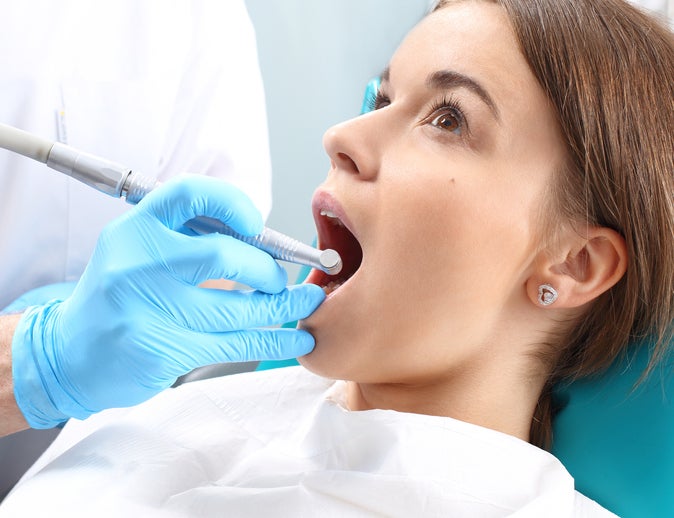
You’ve probably heard of a root canal, because they’re referenced when people are talking about something difficult or painful, and they pop up in dental jokes. Do you know what the term means? While you may be under the impression that a root canal is a form of torture, it is actually a special procedure that’s relatively simple and can often save a tooth.
The term “root canal” actually means two things. It may refer to the part of the tooth between the pulp and the roots. More commonly, it’s a reference to the dental procedure used to relieve root canal pain by removing infected material. Nerves and blood vessels are contained in the root canals of teeth, and by removing a nerve in an infected tooth, a dentist can eliminate pain caused by infection or decay in the pulp. While many people assume that the root canal procedure is painful, it’s rarely more painful than a filling. The time leading up to the root canal, however, can cause a great deal of pain, stemming from several different causes.
- Tooth decay penetrating the teeth can cause root canal pain.
- Cracks or chips that damage the teeth can also be painful.
- Disease in your mouth may cause decay or infection, compelling your dentist to recommend a root canal.
If you are experiencing extreme tooth pain when you eat, or sensitivity to hot and cold that lingers after you’ve removed whatever was hot or cold, you may need a root canal. Other signs that a root canal may be required include a small, pimple-like bump on the gums, darkening of the tooth, or tenderness or swelling in the gums near the painful tooth. If these symptoms are familiar, it may be time to talk to your dentist about a root canal.
Root canals are highly effective, and many teeth fixed using root canal therapy can last a lifetime. The procedure has a success rate higher than 95 percent and involves several steps.
- First, the dentist takes an x-ray to determine exactly how much damage exists.
- A local anesthetic will numb the area to prevent pain, and a rubber dam will be placed around the tooth to keep it dry.
- The dentist will drill an access hole into the tooth and remove the damaged tissue and nerve.
- After the infected material is removed, the tooth may be sealed or given a temporary filling.
- To complete the tooth restoration, a crown or filling is placed.
At Park 56 Dental Group, we offer pediatric, prosthodontics, endodontics, oral surgery, Invisalign®, emergency, and sedation dentistry, all at the highest level of treatment. We serve the Midtown, Central Park, Upper East Side, Park Avenue, and all surrounding Manhattan and New York areas, with a patient-centered practice that has hours to fit your schedule. Schedule your complimentary consultation today by contacting us online or calling us at (212) 826-2322.
-
What are wisdom teeth and should I get mine out?

How much do you know about wisdom teeth? It might surprise you to know that pain related to wisdom teeth is one of the most common reasons people visit the dentist. The third set of molars to emerge from the gums, wisdom teeth can be problematic, causing pain, swelling, and infection even if your oral hygiene is good.
We all grow two sets of teeth over the course of our lifetimes, beginning with the baby teeth, which are gradually replaced with 32 permanent teeth. The last permanent teeth to appear in the mouth ae the wisdom teeth, which come in between the ages of 18 and 25. In days past, people erroneously assumed that wisdom also developed around that time, which is how they got the name. Wisdom teeth are the teeth furthest back in the mouth, and most people have four of them. Many people have fewer, maybe only one to three wisdom teeth and a lucky few have none at all.
Why do we grow wisdom teeth, if we don’t need them? We probably used to need them, but with the evolution of our diet to food that doesn’t wear down the teeth as much, our other teeth have become larger. This means less room in the jaw and not enough space for wisdom teeth to erupt normally. As a result, they can become impacted, emerging at an abnormal angle. This causes pain, either by pressing on the second molar or by remaining partially erupted, which leads to a pocket in the gum where food can collect, causing infection and tooth decay.
If an infection is left untreated, it can spread into the face and neck, sometimes becoming life–threatening. In some rare cases, tissue around the impacted wisdom teeth can develop cysts or tumors. Because impacted wisdom teeth never become fully functional, the best way to prevent them from becoming a problem is to remove them, usually through oral surgery.
Not everyone should have their wisdom teeth removed; if they grow in normally, there’s no reason to do it. Around the time that wisdom teeth normally emerge, your dentist will x-ray your mouth to check on yours. He or she will then be able to recommend removal, if needed, and determine the best time to perform the surgery, for minimal risk.
At Park 56 Dental Group, we provide personalized, quality dental care in a spa-like environment. We offer pediatric, prosthodontics, endodontics, oral surgery, Invisalign®, emergency, and sedation dentistry, all at the highest level of treatment. We serve the Midtown, Central Park, Upper East Side, Park Avenue, and all surrounding Manhattan and New York areas, with a patient-centered practice that has hours to fit your schedule. Schedule your complimentary consultation today by contacting us online or calling us at (212) 826-2322.
-
What is a Root Canal, and When Do You Need One?
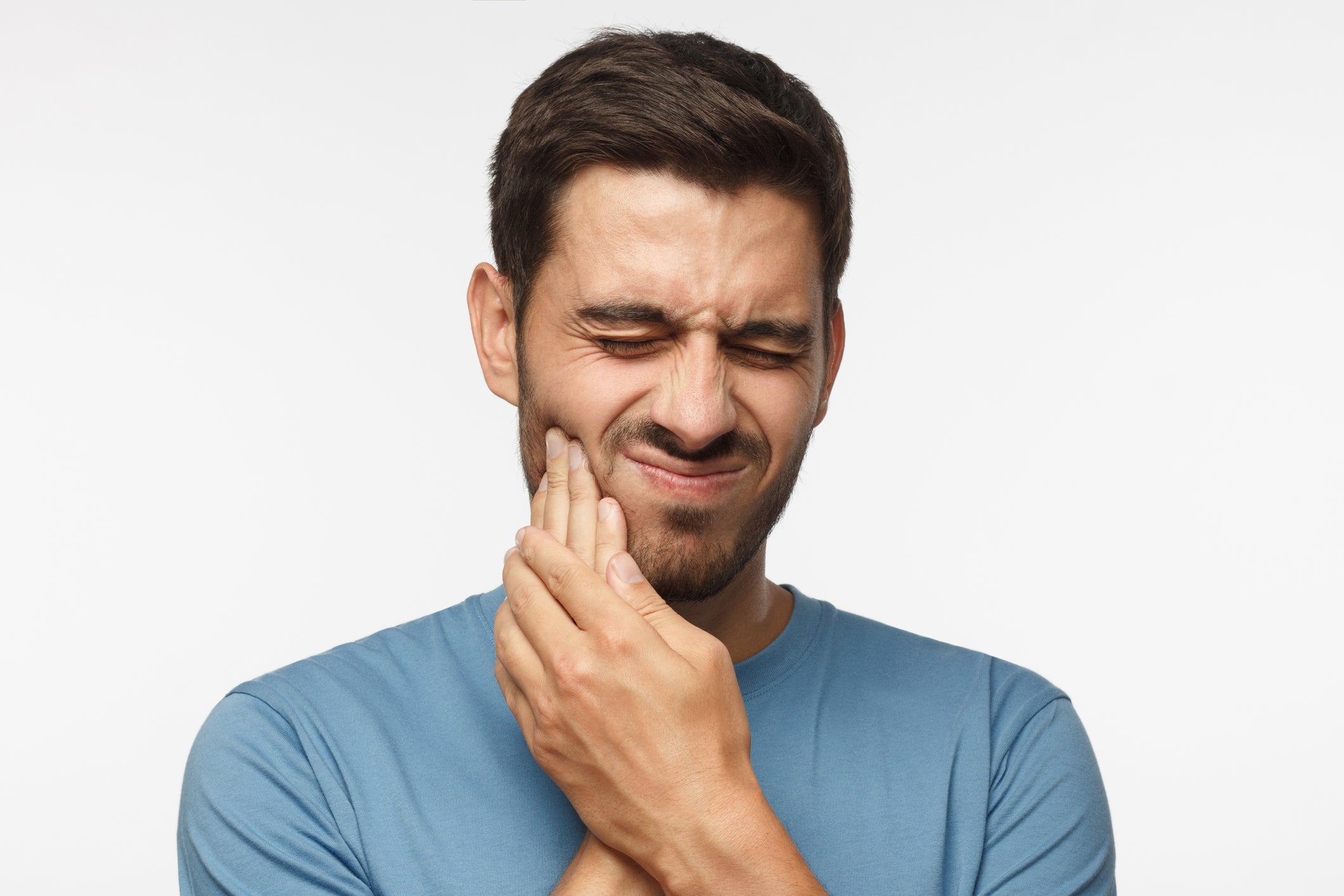
Years ago, deep cavities, diseased nerves, and infections almost always required tooth extraction. Today, teeth can often be repaired and saved thanks to endodontic treatment, also known as a root canal. Learn more about this procedure and how to tell when you might need one.
What is the Purpose of a Root Canal?
The innermost layer of your teeth, known as the pulp, is susceptible to infection. The purpose of a root canal is to remove the infected pulp and the nerves running through it. This helps prevent further complications and restores a healthy, pain-free mouth.
Without a root canal, an infected tooth may develop an abscess. This can be quite painful and puts you at risk of losing your tooth as bacteria damage the bone that connects your tooth to your jaw.
What Does a Root Canal Entail?
The treatment typically takes one to two office visits to complete. Contrary to popular belief, getting a root canal is not excruciatingly painful. In fact, similar to having a tooth extracted, your dentist will use a numbing agent to ensure you hardly feel a thing.
Before the root canal begins, your dentist will take X-rays to help assess the infected tooth and surrounding bone. Then, a local anesthetic is applied to keep you comfortable.
During the treatment, your dentist drills an opening into the tooth through which the pulp and nerves are removed. Don’t worry; taking out the nerve doesn’t affect your tooth’s function—it simply eliminates your pain.
Finally, the inside of the tooth is thoroughly cleaned and filled with a rubber-like dental composite material to seal the tooth against future infection. If an extensive amount of tooth had to be removed, your dentist might suggest placing a crown to protect against cracking. This may need to take place at a follow-up visit.
In the days following your root canal, your tooth and the surrounding area could feel sensitive. You may be advised to take over-the-counter pain relievers until the discomfort passes. You might also receive a prescription for antibiotics to prevent any residual infection from spreading.
As long as you take proper care of your teeth with daily brushing and flossing and routine trips to the dentist, the results of your root canal should last a lifetime.
When Do You Need a Root Canal?
A root canal may be needed if the pulp deep within your tooth becomes inflamed, infected, or damaged. If you experience any of these symptoms, visit your dentist right away to discuss the possibility of a root canal:
- Toothache (mild to severe)
- Pain when you bite down
- Sensitivity to temperature extremes
- Cracked or fractured tooth
- Discolored tooth
- Swollen, tender gums or drainage of pus
Whether you need a root canal or another form of restorative dentistry, Park 56 Dental can help. Our experienced endodontist specializes in pain-free root canal procedures. Contact our dentist office in NYC at (212) 826-2322 to schedule your consultation today.
-
What Constitutes a Dental Emergency?
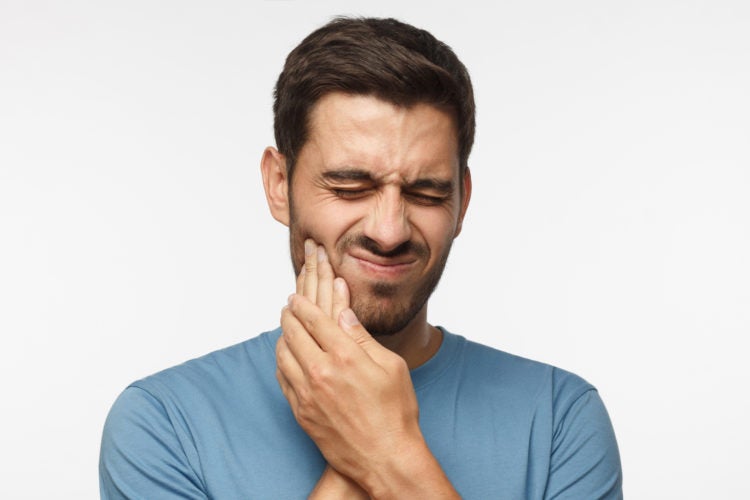
Accidents involving your mouth can occur at any time of day or night. Some oral injuries need immediate treatment, while others are safe to delay until regular business hours. How can you tell a standard dental problem from a truly urgent situation? Answer the following questions to help determine what constitutes a dental emergency.
If you need immediate attention after hours, please call our emergency phone number at (917) 566-9419, and our on-call doctor will help you. If you are unable to reach us during a dental emergency, dial 911.
Are you in severe pain?
If you bite down on something hard or get hit in the face while playing sports, you could chip a tooth and expose a nerve, resulting in severe pain. A toothache from an abscess or serious infection can also be unbearable—and potentially life-threatening.
If you’re in excruciating pain, you shouldn’t wait to get treatment. Call our emergency dentist in NYC as soon as possible!
Is a tooth loose or knocked out?
Adults are done losing their baby teeth. If you feel a permanent tooth wiggling around in your mouth, even if you feel no pain, call an emergency dentist right away.
A knocked out tooth is even more serious. Call your dentist, and while you wait to be seen, handle the tooth as little as possible. If you can, insert the tooth back in its socket and place moistened gauze over it so you can bite down gently and hold it in place. NOTE: Don’t put a baby tooth back in its socket because it could fuse there or damage the permanent tooth beneath it.
If you can’t put a knocked out tooth back in its place, rinse it with saline solution (contact solution) or milk. Then, place the tooth in a container of milk or saliva (preferably from the patient). NOTE: Don’t rinse or soak a knocked-out tooth in water. Also, don’t scrub the tooth.
Are you bleeding profusely?
It’s not a dental emergency if your gums bleed while flossing, but if you have a traumatic injury and start bleeding from the mouth, this is a sign that something is wrong. Call an emergency dentist in NYC to have the problem looked at right away!
What is NOT a dental emergency?
Sometimes, oral trauma occurs, but it’s safe to delay treatment for a few days. Here are some examples of what does not constitute a dental emergency:
- A chipped or cracked tooth with no pain and no sharp fragments.
- Minor toothache with no other symptoms, such as facial swelling, high fever, or bumps on the gums.
- Lost crown or filling. (You can temporarily fill a cavity with sugar-free gum, or put a crown back in place for the time being with denture adhesive or dental cement.)
If you answered “yes” to any of the questions above, you may be having a dental emergency. Call Park 56 Dental’s after-hours dentist for help—(917) 566-9419.
-
Benefits of Under Armour® Mouthguards
Whether you have a new dental restoration like veneers that you would like to protect or whether you simply want to keep your natural teeth safe , a mouth guard can be an excellent choice. Talk to your dentist about this type of protection and read on for a look at the benefits of Under Armour mouth guards.
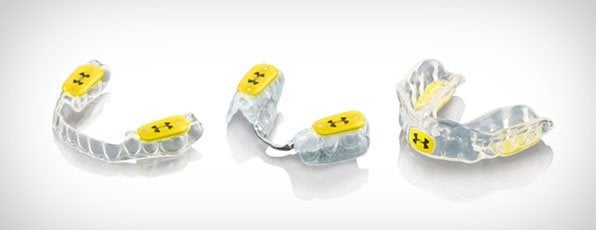
Playing a contact sport without a mouth guard can be risky; you could damage your teeth and possibly injure a teammate or opponent. Fortunately, Under Armour mouth guards are designed for the individual wearer and are capable of protecting your teeth in the event that you sustain impact. They are made from quality materials and are appropriate for all kinds of sports, both contact and non-contact. Talk to your dentist to be fit for your own Under Armour mouth guard.
Do you think you could benefit from this type of Under Armour protection? If so, call Park 56 Dental at (646) 783-3529. It is our mission to serve as one of the best dentists in NYC. If you would like to learn more about our dental bridges or veneers, please do not hesitate to stop in and see us or visit our website.
-
When Are Root Canals Necessary?
A root canal may be suggested by a top dentist to treat an infection in the tooth’s inner pulp. A root canal is generally recommended whenever the pulp has become seriously damaged, and the procedure can sometimes preserve the tooth itself. A root canal may also be advisable if the tooth has developed an abscess or after a deep cavity. Always schedule an appointment with a top dentist in NYC if you are experiencing pain. Continue reading to learn more about why infected tooth pulp, an abscess, or a deep cavity makes a root canal necessary.
Infected Pulp

An infection in the tooth pulp and nerve is the leading reason why the best dentist in NYC performs a root canal procedure. Infections in the pulp can occur for many reasons, including when the tooth undergoes serious trauma. For example, if the tooth becomes fractured after a fall or collision, the nerve can become severed and eventually die. When the nerve dies or is infected, you will likely need to undergo a root canal.
Painful Abscess
Root canals are also performed when an abscess develops around the tooth. An abscess forms when a pus pocket forms around the end of the tooth root. If left untreated by a top dentist in NYC, the infection progresses and pus accumulates in an area of dead nerve tissue. A root canal stops the infection from spreading to the bone.
Deep Cavity
Many times, a root canal procedure is performed to treat a deep cavity. When tooth decay extends to the inner pulp, the pulp will become inflamed with bacteria. The only way to eliminate tooth pain is to perform a root canal and remove the tooth’s nerve.
If you are suffering from tooth pain or sensitivity, schedule an appointment with a top sedation dentist near NYC. At Park 56 Dental , our dentists understand root canal symptoms, and we will do everything to make sure your root canal pain disappears. Sedation dentistry also allows patients to experience no pain during root canal procedures. Learn more by calling (646) 783-3529.
-
How to Handle Dental Emergencies [INFOGRAPHIC]
Everyone wants to have a beautiful smile full of healthy teeth. Even if you brush, floss, and visit a dental clinic near New York City regularly, dental emergencies can happen at any moment. That’s why it’s a good idea to know what to do in the event of a dental emergency. If you have a toothache, rinse your mouth out with warm water and try to dislodge anything stuck between your teeth with dental floss. Never apply aspirin or other painkillers directly to the painful area, as this could burn sensitive tissue. A knocked-out tooth should be handled by the crown, rinsed off, and replaced in its socket if possible; when you see your dentist within an hour of the tooth being knocked out, your chances of saving the tooth are much higher. Take a look at this infographic from Park 56 Dental to learn more about handling common dental emergencies. Please share with your friends and family.

RECENT POSTS
categories
- Uncategorized
- Cosmetic Dentistry
- Veneers
- Healthier Teeth
- Teeth Whitening
- Dental Health
- Video
- Dental Emergencies
- Invisalign
- Dental Implants
- Root Canal
- Sedation Dentistry
- Infographic
- Dental Crowns and Bridges
- Dental Anxiety
- Gum Disease
- COVID-19
- Bad Breath
- New York Dentist
- Cut out sugar
- General Dentistry
- Oral Health
- Oral Cancer
- Dry Mouth
- Gum Health
- Toothache
